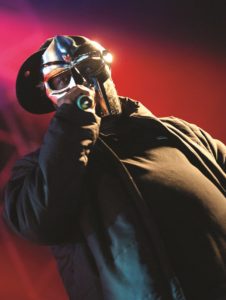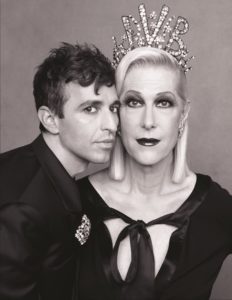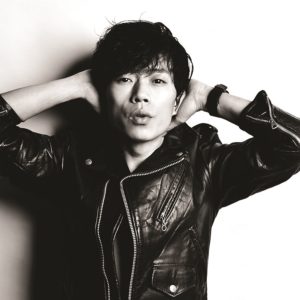Our playlists are often eclectic, as contributors are given musical free reign. This one is especially so. Listen to some unmasked rap, countertenor cabaret, Chinese pop, and classic Billy Joel at tinyurl.com/r22pdszk.

‘Figaro,’ MF Doom
This Oct. 31 marked one year since the untimely death of Daniel Dumile, the man behind legendary hip-hop persona MF Doom. The reclusive artist hid behind a metal mask, ducked the spotlight, and was famous for sending impersonators to perform in his place.
In 2004’s “Figaro,” the enigmatic rapper announces that he’s “the best MC with no chain you ever heard.” That sort of anti-brag is core to Doom’s music. His verses are bound together by so many non sequiturs and deep-cut references that one gets turned around trying to follow any through line. But Doom’s collage-like style is what makes the outsider artist so great.
“Coast to coast, Joe Schmoe flows ill, go chill./ Not supposed to overdose No-Doz pills,” he raps. “Off pride tykes talk wide through scar meat./ Offsides like how Worf rides with Starfleet.” —Cam Blair

‘Didos,’ Anthony Roth Costanzo and Justin Vivian Bond
The concept behind “Didos,” a collaboration between countertenor Anthony Roth Costanzo and cabaret performer Justin Vivian Bond, is genius. It’s a medley of “Dido’s Lament” by Henry Purcell and “White Flag” by English pop singer Dido.
The song is part of “Only an Octave Apart,” a show that just finished a run at St. Ann’s Warehouse in New York City. An album is forthcoming.
It begins with the descending cello line that has made “Dido’s Lament” famous in music theory textbooks. The aria, sung by Costanzo, is kept totally intact. Re-writing would be blasphemy.
The “Lament” finishes unexpectedly on a major chord. When Bond comes in with “I know you think that I shouldn’t still love you,” the shift in mood and vocal range is moving. The refrain of “remember me,” passed between the singers, starts to take on new meaning. It’s no longer about a heartbroken Carthaginian queen, but about modern-day unrequited love.
The song verges on campy in just the right amount. It ends with an excerpt from “Vesti la giubba” from Ruggero Leoncavallo’s opera Pagliacci, which is about a sad clown. For me, “Didos” is about queer culture — a mashup of opera, cabaret, comedy, and tragedy. —Saskia Maxwell Keller

‘Chengdu (成都),’ Zhao Lei
Once, when I was living in China, I was berated for running at 5 p.m. “That rush-hour pollution will get you,” my host mom remarked when I returned, coughing up something acrid and rubbing smog particles out of my eyes. She told me to hit the pavement later, maybe 9 or 10 p.m.
I thought she was nuts. I’d never worry about this in D.C. or Chicago, so I politely shrugged off her suggestion. But the next day, as I was stretching a sore calf, my lungs produced a greenish blob of phlegm.
I took my host mom’s advice. It was a Monday evening — yet the sidewalks were crowded. It wasn’t the feverish haze of a weekend night out; rather, it was a leisurely buzz. Grandmas gathered in parks for aerobic dance classes. College kids filled outdoor night markets, gnawing at lotus root skewers and slurping down Tsingtao. And I passed dozens of fellow joggers, who were relishing the cleaner air.
Usually, I need something peppy to keep me going on runs, but at night, a more easygoing song like “Chengdu” hits the spot. —Jasmine Lu
‘Harmony Hall,’ Vampire Weekend
I listen to “Harmony Hall” by Vampire Weekend for a simple guitar strum. The pattern opens the song as lead singer Ezra Koenig offers his unique vocals. The song gets more vibrant with the introduction of piano and percussion.
But at about the 1:40 mark, the song goes right back to that guitar strum as Koenig sings. There’s something about this little tune that I just love. I would be happy if there were no chorus or development at all — just the strum the entire time.
Occasionally, I find a beat or a bit of melody in a song that occupies only a small portion of time, and I wish the artist would have done more with it. But it’s enough to keep me listening. —Ryan Fitzgerald
‘Vienna,’ Billy Joel
My senior year of college had a before and after.
On one side: bar hopping, final celebrations, the anxieties about “making it” in the world.
Then, seemingly overnight, Zoom meetings across time zones and a frozen job market.
During the personal and global confusions, I often returned to Billy Joel’s 1977 hit “Vienna.”
“Slow down you crazy child/ You’re so ambitious for a juvenile,” Joel sings probingly. “But then if you’re so smart tell me,/ Why are you still so afraid?”
In an interview with Howard Stern, Joel said the song came to him quickly from observing that a lot of people in their 20s think they have to get it all together by their 30s, “killing themselves to get the golden ring.”
I take to his lyrics often as a reminder to keep my dreams big, but slow down — it’s not all in a timeline that can or should be controlled.
I like to think of the song as a timeless coming of age story. Whether you’re 18 or 80, “when will you realize… Vienna waits for you?” —Michaela Chesin



